a) Outstanding Graduate Student Award
b) Early Career Award for Contribution to LGBT Counseling Psychology, and
c) SLGBTI Award for Significant Contribution to Social Justice & Advocacy Award.
Please email nominations to Mirella J. Flores, PhD (she/her) at [email protected] by midnight (PST) on Friday, 6/25/2021. Self-nomination is encouraged!
Be sure to include contact information for both yourself and the nominee. For more information, please see attached flyer and poster.


Please Join Us in Congratulating our Student Poster Presenters

Roberto Renteria
Poster Title: Heterosexist discrimination and LGBTQ+ identity among Latinx sexual minority adults
Roberto Rentería is a doctoral student in the Counseling Psychology program at Arizona State University, having previously obtained his BS in Psychology from Truman State University in Missouri. Roberto proudly identifies as Mexican American and part of the LGBTQ+ community, intersecting identities that influence his research and clinical work.
Roberto’s research interests primarily focus on health disparities among Latinx LGBTQ+ populations, specifically exploring sociocultural correlates of mental disorders and substance use. He hopes to utilize identity development theories to better understand minority stress among Latinx and LGBTQ+ individuals, particularly examining symptoms of depression, anxiety, and addiction. Ultimately, Roberto hopes to expand research that informs culturally-competent interventions to improve well-being and mental health among the Latinx LGBTQ+ community.

Sakina Al
Poster Title: Eudaimonic well-being for lesbian and bisexual women: The roles of religion and social connectedness
Sakina Ali is a third-year doctoral student in Counseling Psychology at Texas A&M University. She holds an M.Ed. in Educational Psychology from Texas A&M University and a B.S. in Psychology from the University of Texas at Dallas.
Broadly speaking, Sakina’s interests are multiculturally-focused and she seeks to empower marginalized populations through research and clinical work. Her research interests include examining the impact of religion/spirituality, conformity to gender roles, and acculturation on mental health outcomes for marginalized populations – specifically Pakistani-Americans and LGBTQ+ people. As a clinician, she works with clients to explore how systems of power and social structures impact the way they understand the world and form relationships. She also works with clients to help them understand how to promote change when dealing with topics such as trauma, identity exploration, and relationship concerns.

Jeffrey S. Minert
Poster Title: Sexual and gender minority status as a moderator between discrimination and social and temporal outlook
Jeff is a fifth year doctoral candidate in the Counseling Psychology doctoral program at Arizona State University. Previously, he spent two years working for a non-profit behavioral health agency in Phoenix as a family support specialist. Jeff’s clinical interests relate to health psychology and he hopes to complete his predoctoral internship at a VA hospital next year. His research interests pertain to examining bullying using a social-ecological model. Jeff’s dissertation explores teachers’ role in bullying that impacts transgender youth.

Elizabeth (Liz) Ollen
Poster Title: Formal and informal help seeking behaviors for relationship abuse among sexual minority women
Dr. Ollen is a postdoctoral psychology fellow in the Nathanson Family Resilience Center at the UCLA Semel Institute for Neuroscience and Human Behavior, where she also completed her pre-doctoral internship in the Stress, Trauma, and Resilience (STAR) track. Dr. Ollen’s clinical and research interests include LGBTQ youth and families, with an emphasis on adversity, trauma, and resilience.
Dr. Ollen’s most recent research includes development, piloting, and implementation of a strengths-based group to foster resilience among LGBTQ adolescents. On her postdoctoral fellowship, Dr. Ollen leads program development for the EMPWR (“empower”) Program, which provides LGBTQ youth and their families with sensitive and affirming care. She also provides direct clinical services at UCLA TIES for Families, where she works with same-sex couples fostering and/or adopting, as well as LGBTQ foster youth.
Link: registration form
Submit a Student Poster to the Section for LGBT Issues!

APA Div. 17’s call for student poster proposals is out!
Submit your poster to the Section for LGBT Issues.
A $100 travel award to Convention will be given to our section’s top 3 submissions.
Deadline is March 20, 11:59 pm PST. Go to http://bit.ly/2jqJf3t for further information and the application form.
On Social Justice Advocacy: An Interview with lore m. dickey, Ph.D
BY MIRELLA J FLORES
lore m. dickey has been a member of APA Division 17 Section for LGBT Issues (SLGBTI) since his graduate student years. As a queer-identified counseling psychologist in training, Dr. dickey joined SLGBTI as a means to connect with others who shared his queer identity, or were interested in working with queer people (queer is being used as an umbrella term to encompass people who do no fit societal norms in regards to gender or sexuality). Dr. dickey is still involved in SLGBTI, and one of his highlights is attending the cabaret SLGBTI hosts every year at APA’s annual convention. Dr. dickey enjoys being able to catch up with colleagues he does not often see, and hear about their work and the challenges they face (i.e., feeling accepted in the communities they live in, doing LGBT work).
In 2015, Dr. dickey was awarded with SLGBTI’s Social Justice Advocacy Award. This recognition comes as no surprise given Dr. dickey’s life-long commitment to social justice. I had the privilege to interview Dr. dickey about his social justice advocacy work. I left our conversation feeling renovated and proud of my counseling psychology identity, and I hope you do too after reading this.
On being a social justice advocate
For Dr. dickey social justice advocacy means, “figuring out those places where something needs to change systemically to be more inclusive of everyone.” Most of his work in the past 15-30 years has been around queer people. Originally, his social advocacy work focused on lesbian and gay people, with more emphasis on lesbians. However, since transitioning, Dr. dickey’s focus shifted to the needs of trans people.
Social justice advocacy is a vital part of Dr. dickey’s being; thus, he decided to go back to school in his early 40s to become a counseling psychologist. Dr. dickey kept hearing about the “horrific experiences trans people had with mental health providers and [he] wanted to be part of the solution, not the problem.”
On the working on the Guidelines
Dr. dickey was appointed as co-chair of the APA Task Force on Guidelines for Psychological Practice with Transgender and Gender Nonconforming People while he had one month left of being a graduate student. As such, one of his challenges was to get the credibility he deserved as a co-chair, while working among people who were his mentors or whom he had applied to for jobs. During this process, Dr. dickey relied heavily for support on his relationship with his co-chair Dr. Anneliese A. Singh. Both being feminist identified, multicultural counseling psychologists, they supported each other as they had certain values they did not want to compromise when working on the guidelines, such as having trans voices heard.
Another challenge faced was following APA’s policy for guidelines, which includes that guidelines should only exist in areas where there is consensus in the field. This presented a challenge for Drs. dickey and Singh when determining APA guidelines for trans children, as the literature is contradictory in this area. They chose to include guidelines for trans children despite the APA policy. Drs. dickey and Singh also received push back on terminology, as guidelines language needs to be aspirational and cannot sound like people are being required to do something. This meant they could not use “advocacy” or call for psychologists to advocate.
Although the guidelines have been published, there is still much work that needs to be done before the guidelines expire in 2022. Dr. dickey is working to develop a Continuing Education training model to help psychologists learn about the guidelines. Dr. dickey is also working on a special issue for Psychology of Sexual Orientation and Gender Diversity that will have follow-ups to the Guidelines. We can expect this special issue to be released in June 2016. Another related effort Dr. dickey is working on is a co-authored book with Dr. Singh that will extend the Guidelines by covering topics they were not allowed to write about or were not allowed to write about in they ways they wanted to. This book, Affirmative Counseling and Psychological Practice with Transgender and Gender Non-Conforming Clients, will be available at APA’s 2016 conventionand is written specifically for psychologists. We can expect this book to address everything from research to working with children, older adults, and many marginalized groups that you do not usually see in the literature.
On making this world a safer place for trans people
Dr. dickey has been involved in multiple advocacy efforts, but he is most proud of the one that he is still developing. He was able to tell me it will be a suicide prevention tool targeted at trans people. Dr. dickey described this project as “elegant,” meaning it is simple and gets the job done. As Dr. dickey stated, “suicide amongst trans people is an epidemic in this country,” and he hopes this tool will be really helpful to trans people. If this project is approved, Dr. dickey will be spending the next 8-12 months figuring out how to make it a non-profit organization in order to be able to collect money to help support the organization.
Through his career as a counseling psychologist, Dr. dickey has worked to get trans people recognized within APA. Dr. dickey was part of the discussions for SLGBT and Division 44 to include transgender in their names. He also helped develop the annual Transgender Research Award, which is a $500 award for psychological research that addresses transgender issues and is in its seventh year.
On mentoring student advocates
Dr. dickey’s has also mentored students involved in advocacy work. Being someone who enjoys working with people, Dr. dickey often asks himself, “how can I be a resource to other people, to help them in what is important and to articulate their plans and ideas.” Such willingness to help led Dr. dickey and Luke Allen, a Counseling Psychology graduate student at the University of Missouri-Kansas City, to work on an Advocacy/Best Practice Guide to Improved Campus’ Climate for Transgender and Non-Conforming Students, Staff, and Faculty. They hope to present this at WPATH’s upcoming conference, and that WPATH will make a policy statement about the importance of creating affirming campus climates across the U.S. and the world.
On doing social justice work
Dr. dickey advises counseling psychology students who want to pursue social justice advocacy to get involved by putting their names in the hat when calls for nominations come out, such as for community outreach programs that are part of APA’s conventions. Dr. dickey also recommends attending and presenting at the National Multicultural Conference and Summit.
Dr. dickey emphasized the importance of building support, from friends and peers to mentors, because “you can not this work by yourself, you’ll burn yourself out too quickly.” As someone involved in social justice work, Dr. dickey also spoke to the importance of self-care and good work-life balance skills. I will leave you all with this quote and encourage you to sit with it for a minute: “What are you doing to take care of yourself? Because if you do not take care of yourself, all the social justice stuff that you do in the world is not going to make a hell means difference, because you will not be able to keep up the work.”


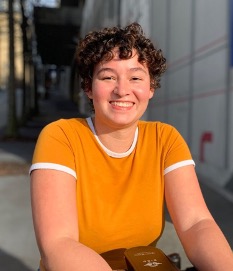
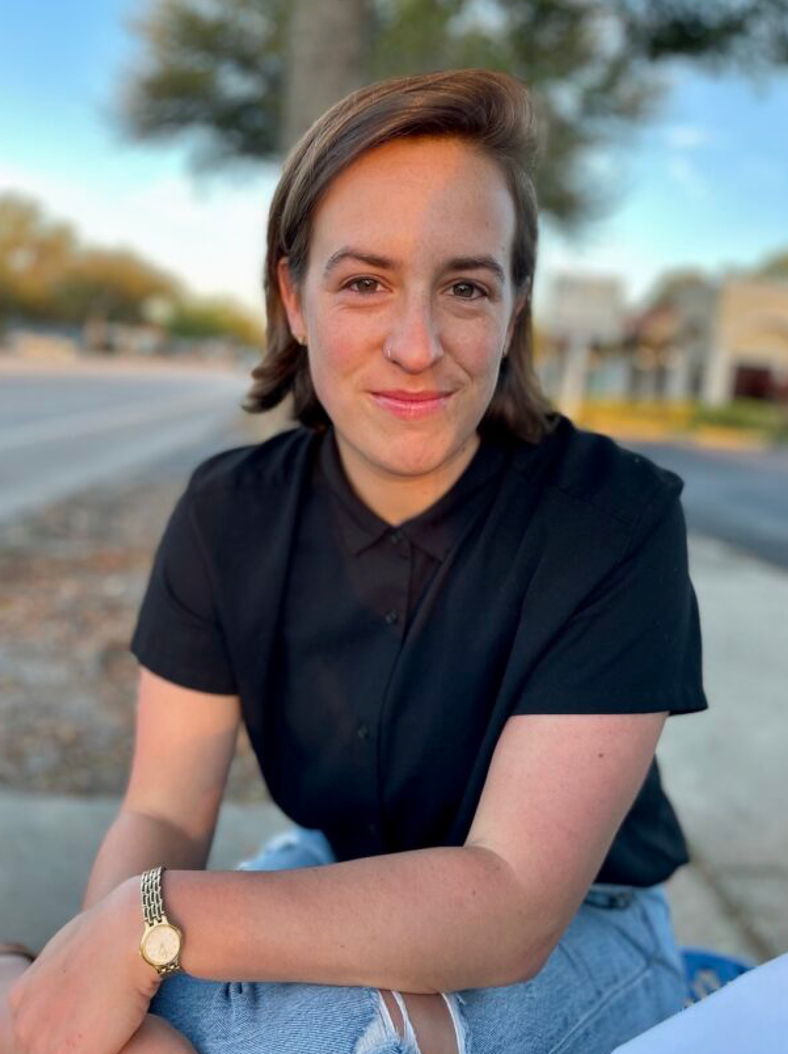
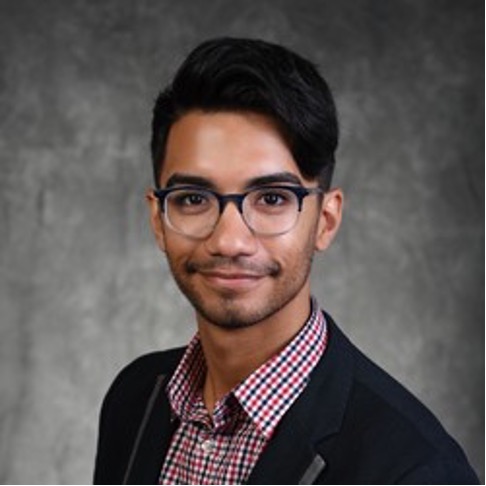
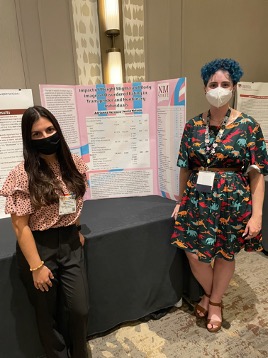
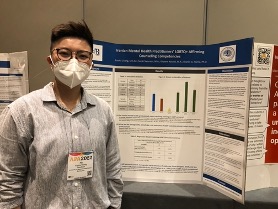
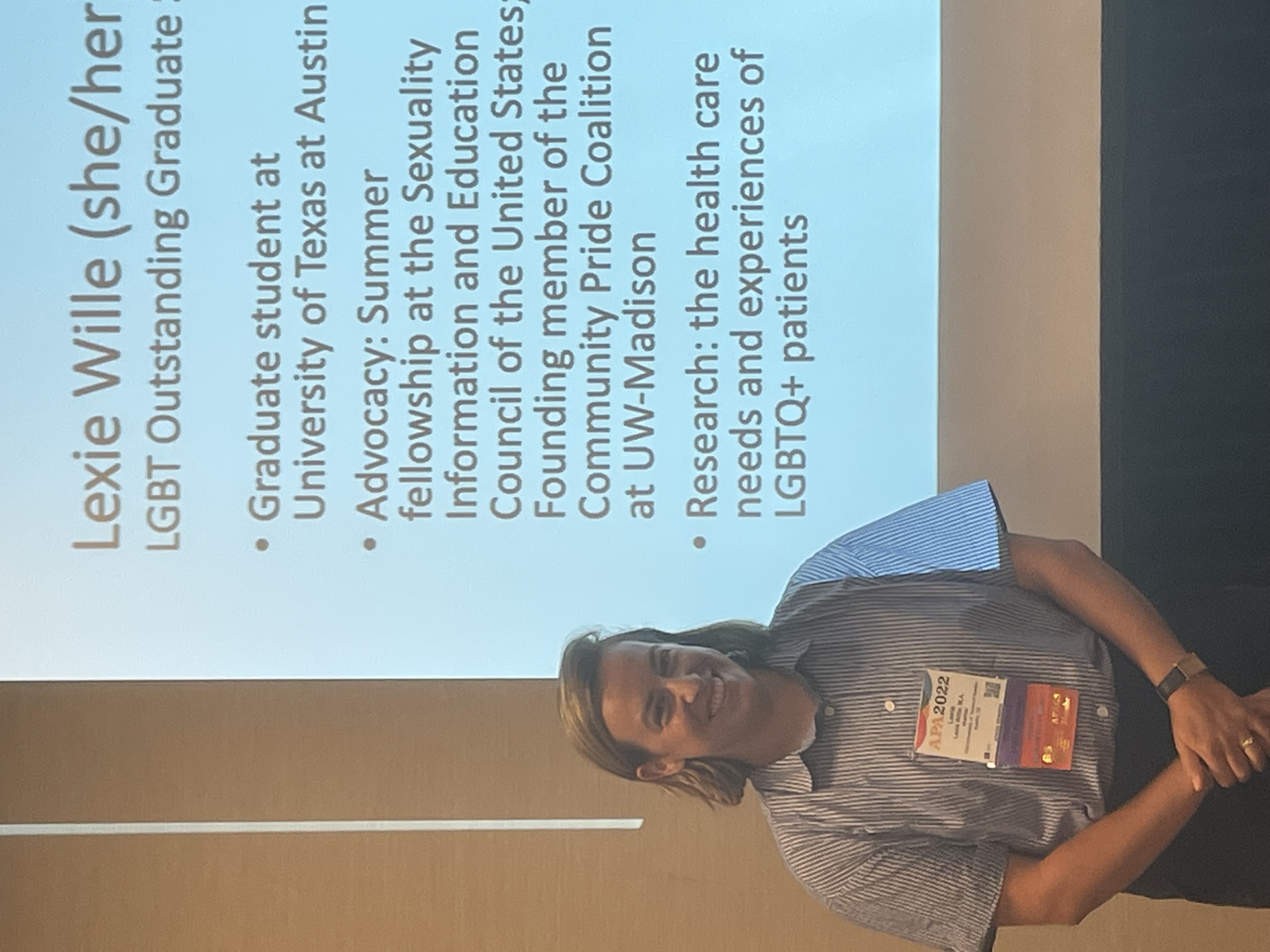
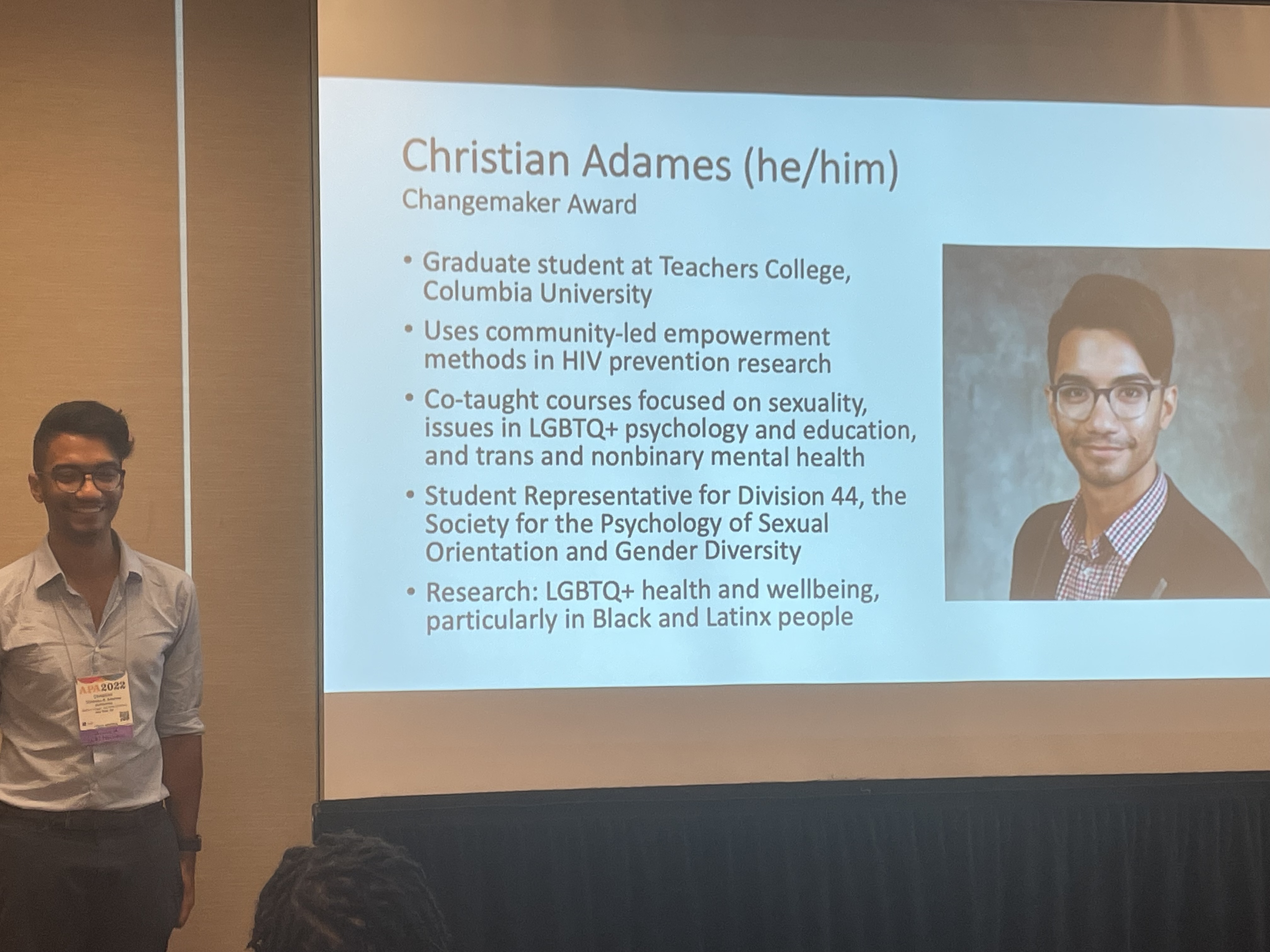
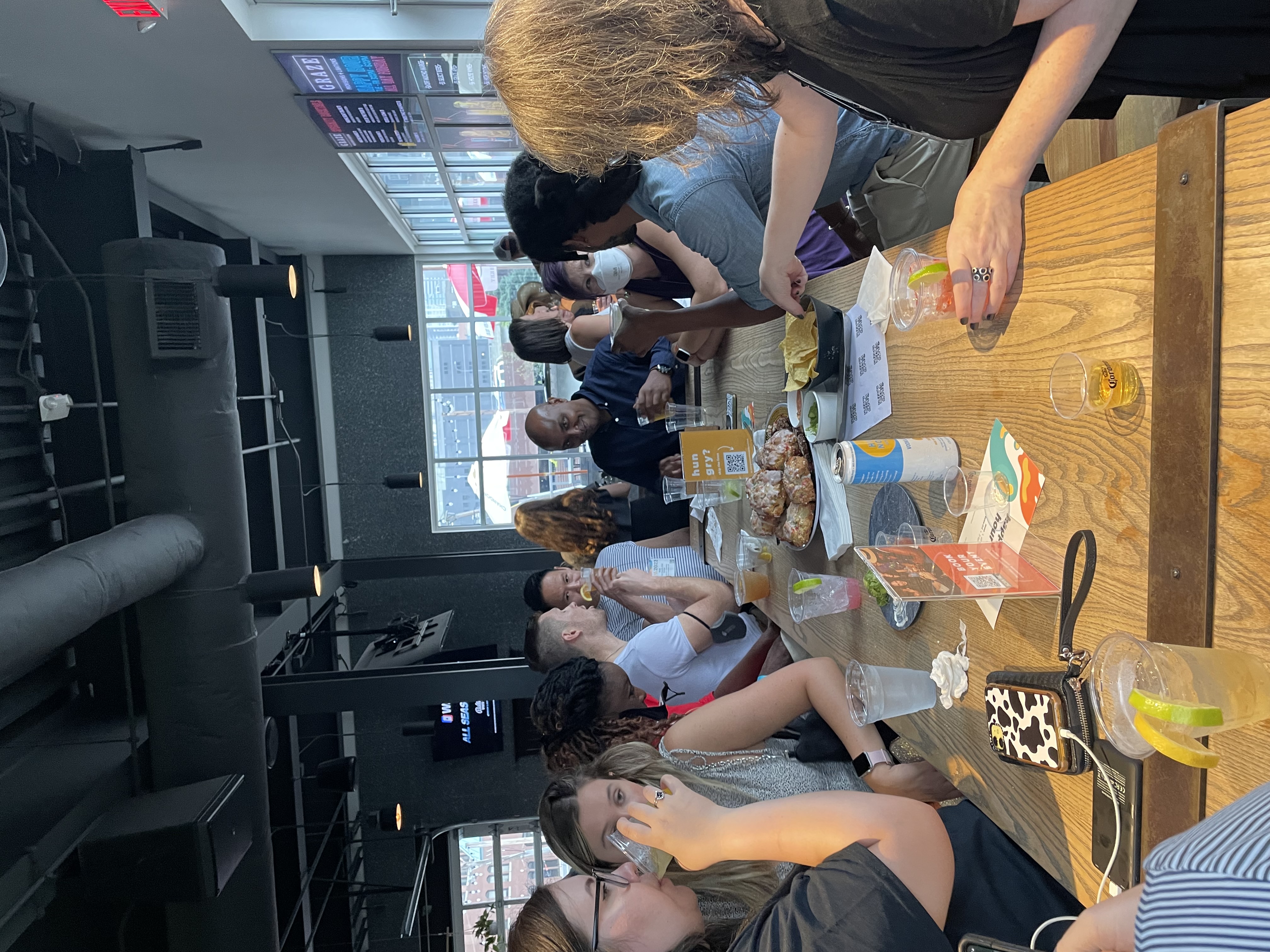
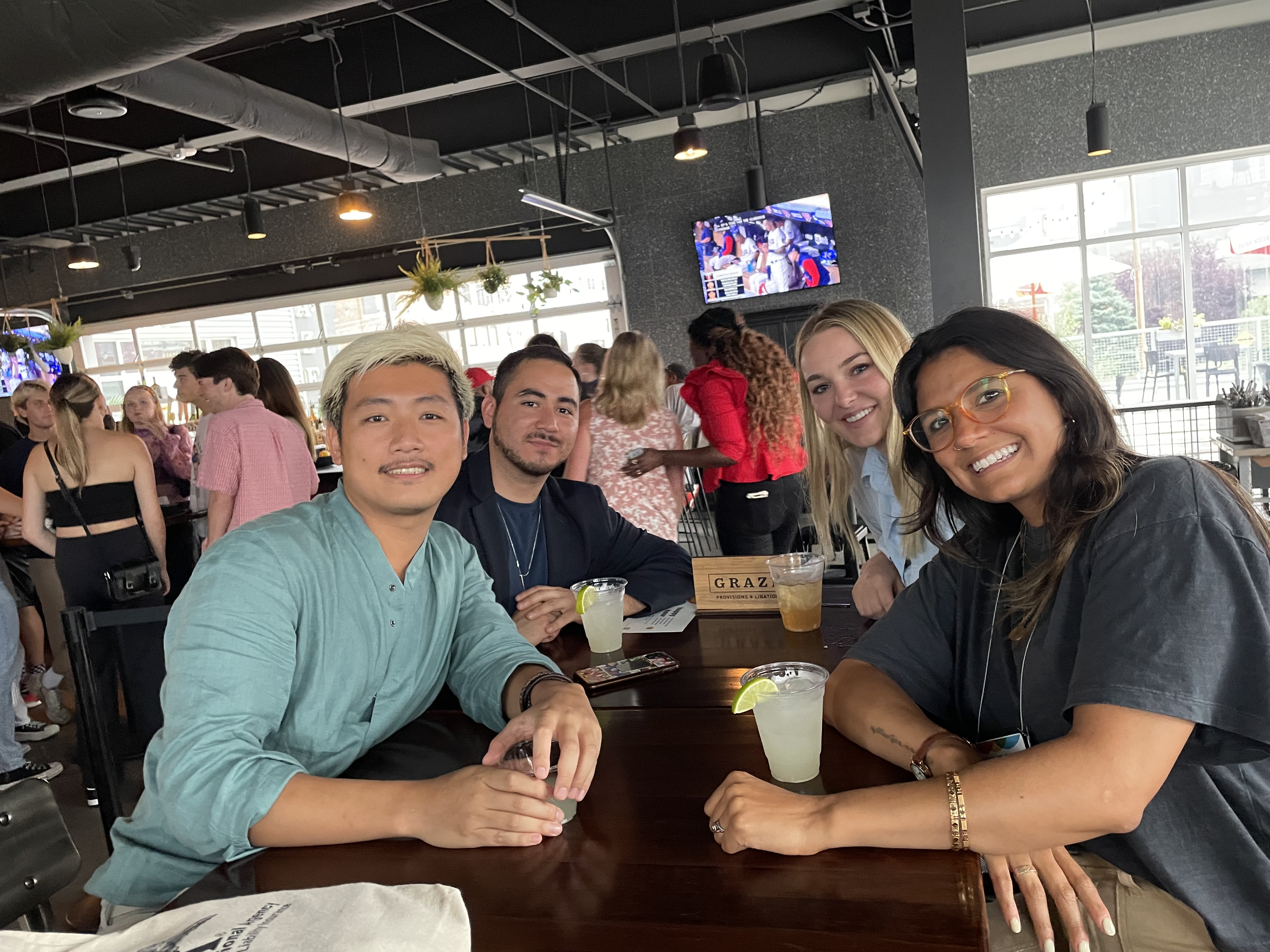
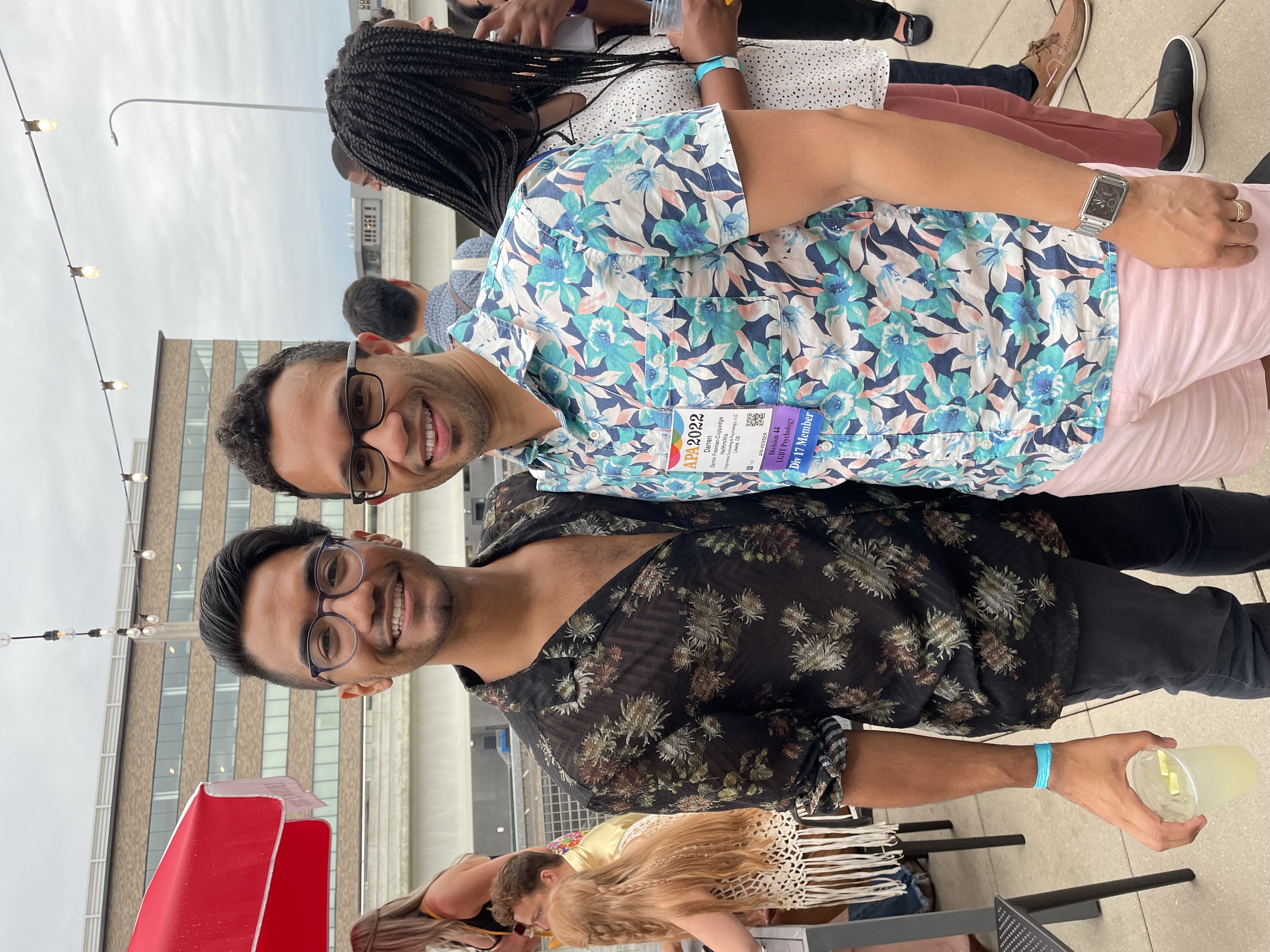
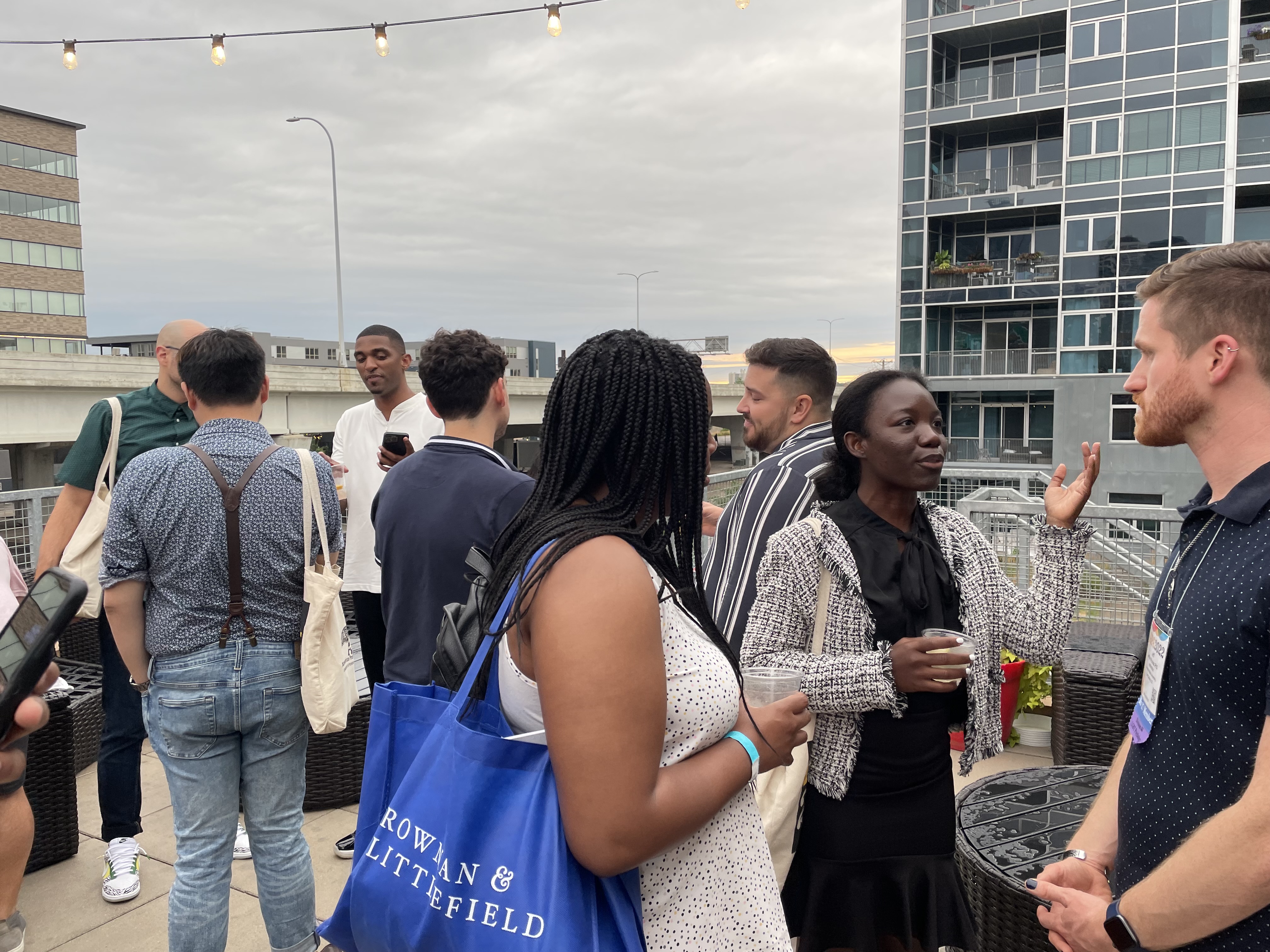
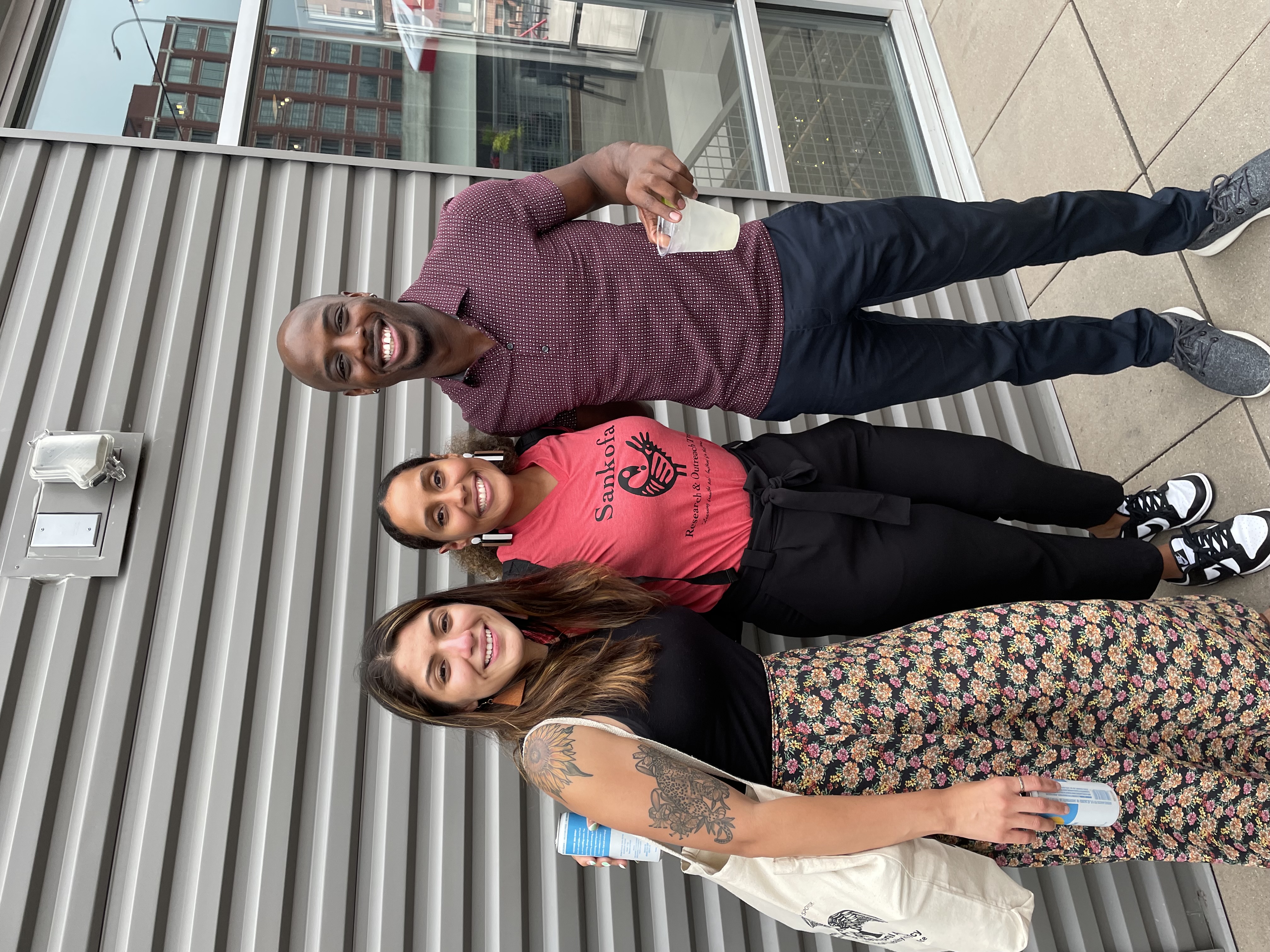

 LGBT Outstanding Graduate Student Awards
LGBT Outstanding Graduate Student Awards